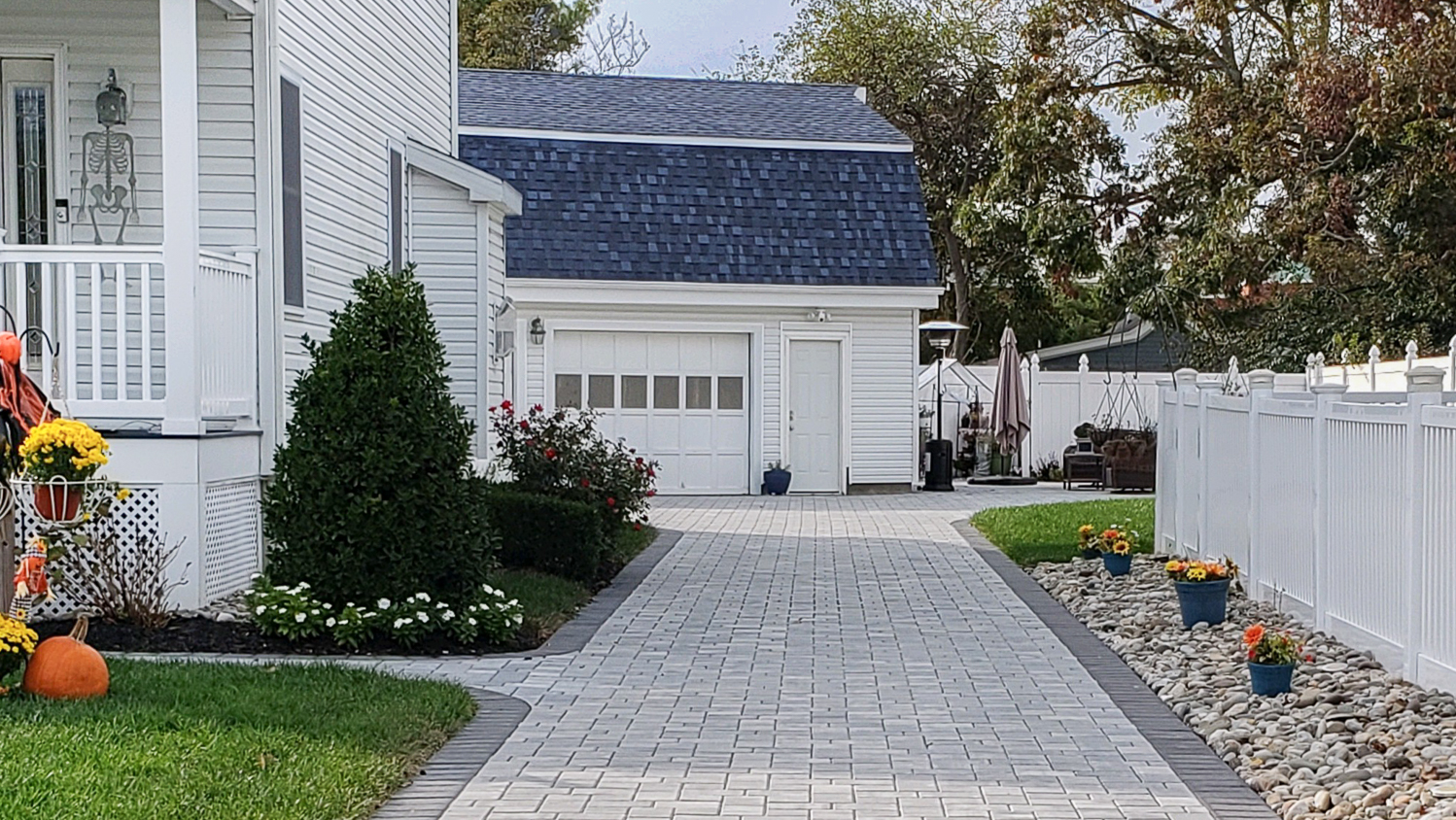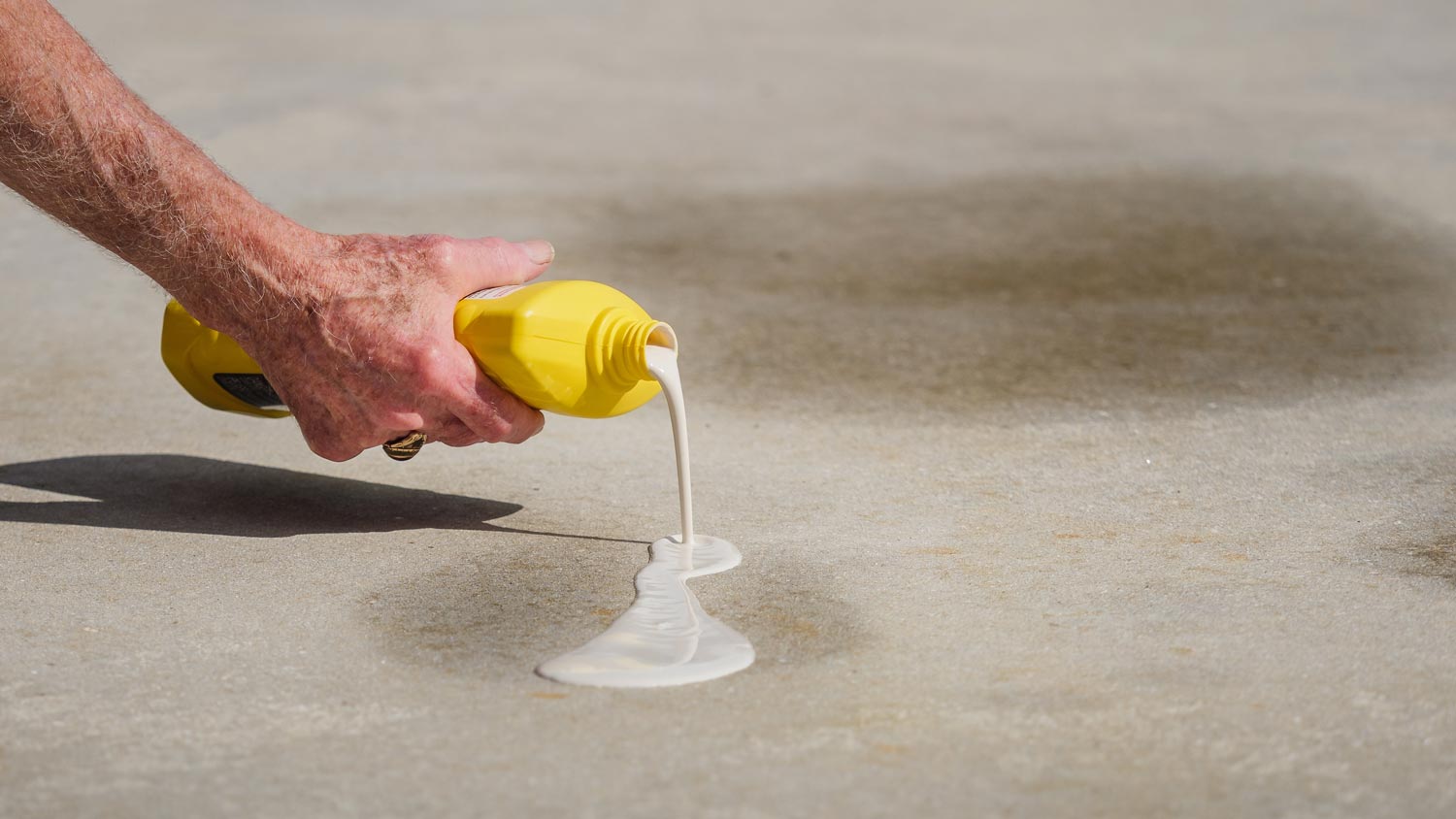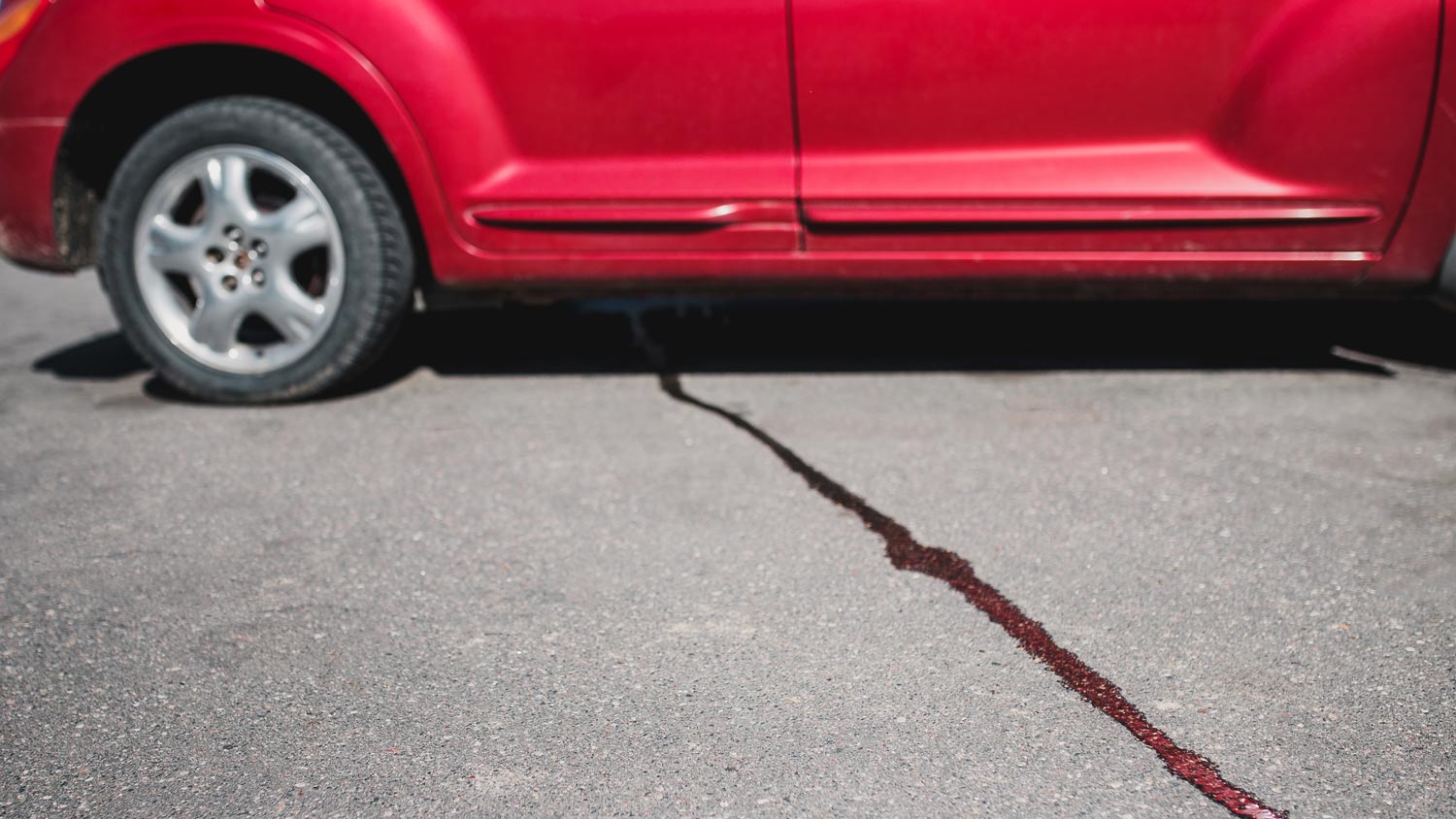
Discover the average paver driveway cost, including price ranges, key cost factors, and tips to help you budget for your driveway project.
Stains are for tie-dye shirts, not driveways


While hiring a pro to pressure wash a driveway costs around $80 to $200, they’ll know what settings and attachments to use to prevent damage to your driveway.
Oil, rust, mildew, and tire mark stains may call for commercial-grade equipment and cleaners to fully lift, which you may not have access to.
Call a power washing pro for large stains or stains impacting older driveways to ensure a gentle yet effective cleaning.
We all want clean and pristine driveways, but cars leak and, well, you know the rest. Driveways are susceptible to oil and grease stains caused by resting automobiles, but that’s not all. Dried leaves, fertilizers, plant food, and even rust-prone rocks can cause driveway stains.
Scary, right? Don’t fret. You can clean most driveway stains to avoid the cost of paving your driveway again. Follow our guidelines to learn multiple ways to clean and de-stain your driveway so it looks as clean as the day the concrete truck poured it out.
Driveways are outside, and as such, they are subject to those ornery elements. Anything that comes in contact with your driveway has the potential to leave behind a mark. For example, leaves left on the driveway can congeal into a brown stain and certain rocks leave rust stains when exposed to heavy rains. Your gardening also has an impact on driveway stains, as fertilizer and plant food cause discoloration over time.
Of course, there’s also the SUV-shaped elephant in the room. Automobile-related grease and oil contribute to the vast majority of driveway stains. This type of stain is especially prevalent when vehicles sit for several months without being used. Oil is something that causes concrete to crack, especially for asphalt driveways, as it can break down the asphalt’s structure and integrity.

Noticing a driveway stain is easy, as they stick out like a sore thumb. However, these stains don’t advertise what put them there, and knowing the cause can simplify the driveway repair process.
There are six liquids that drip from automobiles and cause driveway stains: oil, gas, brake fluid, transmission fluid, gear oil, and coolant. Additionally, many other issues cause driveway stains.
Gasoline: To identify a gas stain, use your nose. If it smells like gasoline, it is gasoline.
Brake fluid: These stains are light and barely noticeable, but look for discoloration around where your car's wheels rest.
Oil, transmission fluid, and gear oil: These stains are all similar in appearance and viscosity, with some minor differences. Transmission fluid is reddish and slightly opaque, oil is a darker brown, and gear oil is the darkest of all, with a foul smell. Check the transmission dipstick and compare it to the stain.
Coolant: If you notice a faintly green stain on your driveway with a slightly sweet smell, it is likely coolant.
Fertilizer and plant food: These stains are orange, as fertilizer contains metal compounds that rust over time.
Rotting leaves: These stains appear light brown and may include a stubborn leaf or two as a dead giveaway.
Winter weather residue: De-icing salts can leave behind a white residue, even on driveway material designed for cold weather.
First, move any vehicles parked on the driveway to allow for immediate access. Next, perform a simple spot clean of the entire driveway and surrounding sidewalk and pavement. Sweep away debris and remove any plant detritus from the area. Installing a concrete driveway costs $2,340 to $10,000, so make a habit out of performing this cleaning process to ensure longevity—stains or not.
Follow these helpful methods for removing driveway stains to keep your curb appeal on point.
Believe it or not, baking soda is great at removing the vast majority of driveway stains, including most vehicle-related stains.
Gather your tools and supplies, including baking soda, a stiff nylon brush, and a functional garden hose.
Pour a generous amount of baking soda directly over the stain and scrub it thoroughly with the brush to allow it to soak into the stain.
Let the baking soda sit for at least 30 minutes to give it time to work its magic.
After 30 minutes, rinse off the stain with a hose. It should wash right off.
Stubborn stain? Repeat the process as many times as necessary.

Powdered laundry detergent removes many types of stains, especially those caused by rotting leaves and fertilizer. Though this method is adequate for removing car-based stains, you can expect to repeat the process two or three times for the desired results.
Gather your laundry detergent, a stiff brush, a garden hose, and a mop.
Mop the area to remove any excess liquid.
Sprinkle a generous amount of detergent on the stain, add a bit of water, and scrub the area thoroughly.
Let the detergent sit for at least 30 minutes.
Rinse it off with a garden hose and repeat the process if necessary.
A simple mixture of vinegar and water is effective at removing rust stains, especially those caused by plant fertilizer, though this formulation struggles slightly with oil and grease stains. As an added bonus, this cleaning solution won’t damage nearby plants and flowers.
Fill a spray bottle with equal parts water and vinegar. For a cleaning boost, add lemon juice or liquid dish detergent.
Spray the mixture onto the stain and allow it to sit for around 30 minutes to loosen up the sediment.
Scrub the area thoroughly with a stiff nylon brush until the stain disappears.
Rinse the area with a garden hose.
Repeat if necessary, but not too many times, as multiple applications in a short time frame leads to slight concrete degradation.

There are many surprising uses for liquid dish soap that go above and beyond cleaning dishes. This household cleaning agent is highly effective at removing plant-based driveway stains. Though a superstar with stains related to rotting leaves and plants, liquid dish soap is not that effective with oil, grease, and many automobile-based stains.
Spray the stained area with a garden hose to clear any lingering dirt.
In a large bucket, combine ½ cup of liquid dish soap with 3 gallons of hot water.
Slowly pour the solution onto the stain and use a stiff brush to work the liquid into the driveway.
Let it sit for 10 to 15 minutes, and then rinse the area with a garden hose.
Repeat if necessary and combine with previous methods, like powdered detergent, for stubborn stains.
Yes, it’s true. Soft drinks like Coke and Pepsi include multiple acids that work together to remove grease stains, such as carbonic acid, phosphoric acid, and citric acid. While highly effective for vehicle-adjacent grease and oil stains, soda is only moderately effective in removing other types of stains.
Use a mop to remove any excess grease or oil from the area.
Pour one or two cans of soda directly on top of the stain.
Let it sit at least 30 minutes, but for the best results, wait overnight.
Scrub thoroughly with a stiff brush, dry towels, or a mop until the stains disappear.
Rinse with a garden hose and repeat the process if necessary.

Cat litter is not just for feline waste anymore, as it doubles as a handy stain-removing agent. Cat litter is an absorbent substance and an irritant, and it’s pretty effective at removing most types of stains, even stubborn oil stains.
Grab a box of cat litter and pour a generous amount on the stain, making sure to cover it completely.
For small stains, let the litter sit for about 30 minutes. For larger stains, let it sit overnight.
Sweep up the litter from the stained area.
Add a bit of dish soap and scrub the stain with a stiff bristled brush until the stain disappears.
Rinse liberally with water from a garden hose.
Repeat this process if necessary.
Avoid using bleach directly. Instead, mix bleach with water. A common ratio is mixing one gallon of water with 1/3 cup of chlorine bleach. Bleach works great on stubborn stains that won’t go away with other cleaning methods.
Mix the bleach-water solution
Apply the bleach solution over the stain with a spray bottle. Make sure the stain is well-soaked.
Let it sit for at least five minutes.
Gently scrub with a metal bristle brush or a piece of steel wool.
Repeat this process a few times until the stain is removed.
Rinse with water
One thing to keep in mind is that you may find your eyes and lungs burning from direct bleach exposure. It can also burn your skin. Therefore, it’s best to wear a mask, protective glasses, and work gloves if you’re cleaning your driveway with bleach.
If your stains are especially large and stubborn, DIY mixtures using common household supplies may not cut it. In these cases, buy a dedicated stain remover designed specifically for cleaning your driveway. These cleaners are available in different formulations for asphalt and concrete driveways, so do your research before making a purchase.
Each cleaner or degreaser features unique and specific instructions, so read the manual before beginning this process.
In most cases, apply the cleaner to a bucket or spray bottle and apply it to the stain, allowing it to rest for at least 30 minutes.
Scrub thoroughly with a brush to remove the stain, then rinse with water, repeating the process if necessary.
Luckily, driveway cleaning is a fairly budget-friendly process, depending on your chosen method. If you choose to DIY the concrete cleaning process, you can expect the cost of materials and tools to run up to $30 if you are starting from scratch. On the other hand, you can hire a local pressure washing pro to clean your driveway stains with speed and efficiency. The cost to pressure wash a driveway is $80 to $200, depending on the size and complexity of the job.
Prevention is better than the cure, as they say. Here are some tried-and-true methods for preventing driveway stains on your property.
Act quickly: Cleaning up a stain as soon as it appears is much easier than removing it after it’s caked into the driveway.
Service your vehicles: Since automobile-related leaks contribute to most driveway stains, stay on top of service and maintenance needs. If you notice a leak of any kind, fix it immediately.
Apply a sealant: Driveway materials like concrete respond well to dedicated sealants that repel oil, grease, and other stains. These sealants are easy to use, and they dry clear, making for a fuss-free application process.
Clean and maintain the driveway: Make cleaning the driveway part of your regular routine to remove debris, fallen leaves, and errant liquids.
In most cases, cleaning driveway stains is a DIY-friendly process requiring minimal time and materials. However, each driveway and stain is different.
For large stains or stains impacting older driveways, hiring a pressure washing professional ensures a quick turnaround and a gentle, yet effective, cleaning process. Additionally, pros will evaluate whether your driveway needs any repairs or is due for any maintenance. Gasoline stains, for instance, damage asphalt driveways, requiring a local asphalt sealing pro to seal the driveway after stain removal.
From average costs to expert advice, get all the answers you need to get your job done.

Discover the average paver driveway cost, including price ranges, key cost factors, and tips to help you budget for your driveway project.

The cost of a tar and chip driveway falls between gravel and asphalt. Is this unique process the happy medium you've been looking for? Let's take a look.

Don’t knock it until you try it. A heated driveway can save you a lot of manual labor in colder months. Here’s a breakdown of the cost of a heated driveway.

Is rainwater constantly building up on your driveway, walkway, or patio? Find out how permeable paving could be the answer to your problems.

Our eight gravel driveway maintenance tips, including raking and spraying, make it easy to keep your gravel driveway looking good and functioning properly.

Want to know the best time to seal a driveway? Our guide will help you determine when to seal your driveway—and when it’s a bad idea.